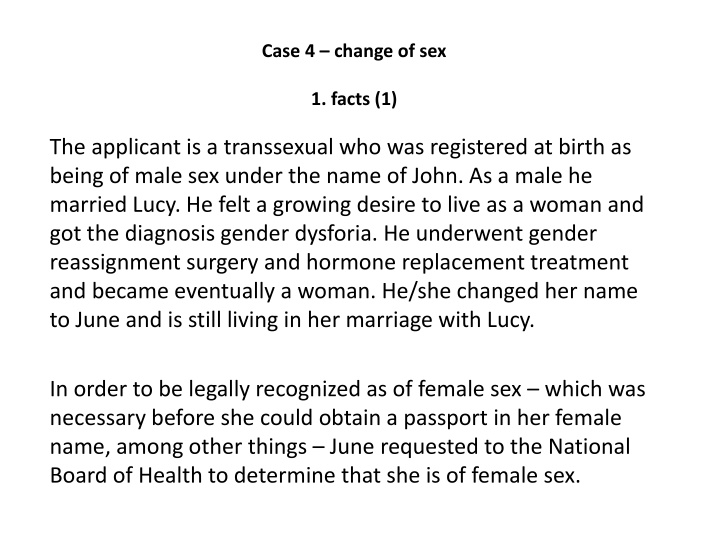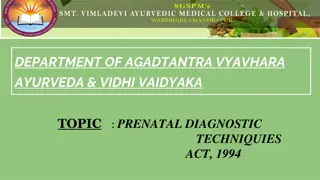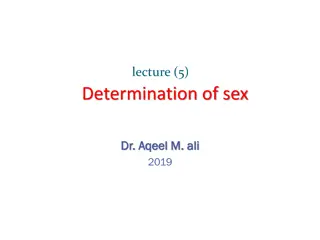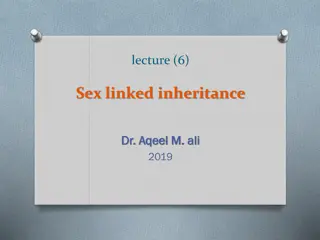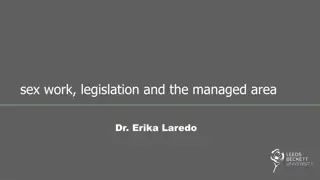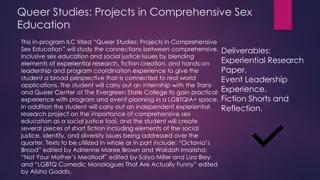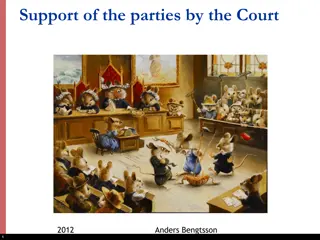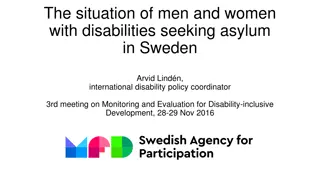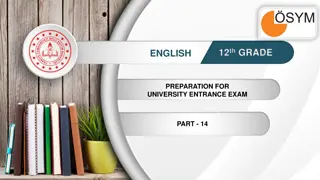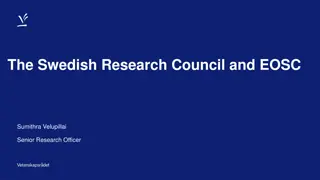Legal Implications of Change of Sex in Sweden: A Case Study
The case involves a transsexual individual, June, seeking legal recognition as female in Sweden, facing obstacles due to an outdated law requiring divorce before gender reassignment approval. The National Board's decision was challenged in court highlighting ECHR principles, legal hierarchy, and previous case law. The conflict between national law and ECHR raises questions on human rights, judicial duties, and legal adaptation in a changing societal context.
Download Presentation

Please find below an Image/Link to download the presentation.
The content on the website is provided AS IS for your information and personal use only. It may not be sold, licensed, or shared on other websites without obtaining consent from the author.If you encounter any issues during the download, it is possible that the publisher has removed the file from their server.
You are allowed to download the files provided on this website for personal or commercial use, subject to the condition that they are used lawfully. All files are the property of their respective owners.
The content on the website is provided AS IS for your information and personal use only. It may not be sold, licensed, or shared on other websites without obtaining consent from the author.
E N D
Presentation Transcript
Case 4 change of sex 1. facts (1) The applicant is a transsexual who was registered at birth as being of male sex under the name of John. As a male he married Lucy. He felt a growing desire to live as a woman and got the diagnosis gender dysforia. He underwent gender reassignment surgery and hormone replacement treatment and became eventually a woman. He/she changed her name to June and is still living in her marriage with Lucy. In order to be legally recognized as of female sex which was necessary before she could obtain a passport in her female name, among other things June requested to the National Board of Health to determine that she is of female sex.
Case 4 change of sex 1. facts (2) The National Board of Health dismissed her request. The reason for its decision was the following. According to the 1972 Act on the determination of Sex in Special Circumstances a request could never be granted if the applicant is married. Therefore June must divorce Lucy before her request could be granted.
Case 4 change of sex 1. facts (3) Lucy appealed to the Administrative Court in Stockholm and claimed that the decision of the National Board was contrary the article 8 ECHR. She underlined that since 2009 same-sex marriages are allowed in the Marriage Code in Sweden. The 1972 act is based on the old legislation and is now obsolete. If she was forced to divorce her wife it would mean legal and economic consequences, regarding pension, insurance benefit, etc as well as emotional trauma. It was also discrimination of her and her wife as nobody else could be forced to divorce. The National Board of Health objected to the appeal and said. According to the Swedish constitution the wording of a legal act is legally binding. The National Board therefore has to follow the 1972 act even if it is obvious that this act is obsolete now when same-sex marriages are allowed. It is the legislator that has to decide to adapt the 1972 act to the new Marriage Code.
Case 4 change of sex 2. applicable law The ECHR is legally binding in Sweden according to a special law from 1994. The ECHR and the national Swedish legislation are on the same level in the law hierarchy. According to the Swedish legal doctrine the ECHR can be applied before the national legislation only if there is a very clear support either in the convention itself or in the case law from the European Court of Human Rights. Case law: Parry against the United Kingdom and R. and F. against the United Kingdom, the 28 November 2006. The Court decided that there was not a breach of Article 8 to require that the applicant divorce before he or she could obtain a legal recognition of his or her new gender. The Court took into account that according to the national law in the cases (English respectively Scottish law) same-sex marriages are not permitted. The Court thus took into account that the national legal system was coherent .
Case 4 change of sex 3. questions 1. Do the respective Swedish provisions contravene Art. 8 of the Convention? 2. Which are the relevant rules for the duties of the national judge in such a situation? Is this question governed by the Convention itself or by national law? 3. How would you handle such a situation in your national legal system? 4. How would you decide this case if you were in the position of a Swedish judge? 5. What do you think about the Swedish doctrine of very clear support ? 6. How would you solve question ./2 in case of a contradiction of national law (also) with the FRC or other norms of EU-law directly applicable in the respective case?
